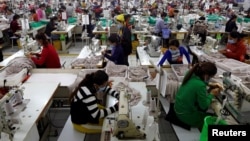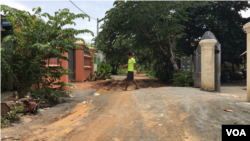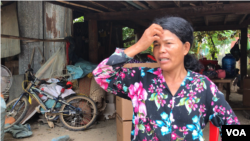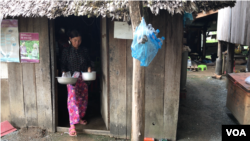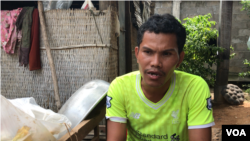Trach looks like any other ordinary rural Cambodian village on the fringes of the municipal district of Chbar Mon in Kampong Speu province, with its dusty and bumpy roads surrounded by paddy fields and the standing palm trees for which the province is known.
This village in the Ka Haeng commune of the Samraong Tong district is steps from National Road 4, which connects the capital city of Phnom Penh with Sihanoukville, the primary seaport. As the nation's garment manufacturing industry expands, National Road 4 guides it west to the southwest coast.
Krech Thon is at home as her children and neighbors gather for a drink. Workers, many of them from the garment factories, have returned to their homes for one week to celebrate the annual late-September ancestral Buddhist festival, Pchum Ben.
It is hard to find a single household in Trach that does not have at least one family member, usually a younger one, employed in the garment industry.
Trade agreement
Relying on the garment factories – directly and indirectly – Trach village is likely to be hit hard if the European Union revokes the preferential trade arrangement Cambodia enjoys under the Everything but Arms (EBA) scheme, which permits the duty-free export of all products, except for weapons and ammunition, to the EU.
The EU is considering revocation because it is concerned that Cambodia’s increasingly authoritarian government violated the agreement when the Supreme Court dissolved the country's main opposition party, the Cambodia National Rescue Party, in November 2017, and Prime Minister Hun Sen launched a crackdown on civil society organizations and the media that continues. His ruling Cambodian People’s Party won all 125 seats in the National Assembly in 2018.
Without its EBA status, Cambodia would lose its preferential access to the EU market, which, according to the World Bank, buys 40% of the nation’s exports.
If Cambodia loses its EBA status, exports to the 28-nation bloc would face a tariff of $700 million annually, according to government estimates. Loss of EBA status would also shred a key competitive edge Cambodia enjoys.
The EU told VOA Khmer in August that it would announce a decision February 12.
Earlier this month, Prime Minister Hun Sen traveled to Europe and secured the backing of the Czech Republic, Hungary and Bulgaria for continuing EBA preferences for Cambodia.
The EBA initiative, meant to aid developing nations, has done just that in Cambodia.
Krech Thon, a longtime resident of her village, has seen changes over the years. “People are getting a little better off with more brick-made houses and fences, and more young people drinking,” she told VOA Khmer with a laugh.
All four of Krech Thon’s four children work in Phnom Penh garment factories. And when factories appeared near the village, she began selling food to the workers.
The importance [of the factories] is that my children are employed and I myself have a business opportunity to sell foods out there so that we have a combined higher income,” she said.
Of the 115 households in the village, accounting for about 570 people, 75% of the residents rely on working in the garment factories or selling food to those employed by them, said Svay Tem, the village chief.
Industry's beginnings
Ten years ago, as garment and luggage factories began arriving along the National Road 4, Phan Sorphea began selling food, including fried fish, rice and meatballs, to the workers.
“Although I did not plan it, I have this as my main source of income now,” Phan Sorphea, 37, said, adding she earns between 40,000 to 60,000 riel [$9 to $15] per day after expenses.
“I could also join the factories as a worker, but I decided to remain a food vendor so that I could have enough money to spend every day, although as a worker, you have a salary at the end of the month,” she added. “It is a matter of choice.”
But she, as is true of almost all the villagers in Trach, knows nothing about the possible EBA revocation. Not even Kong Sina, the wife of Trach village chief Svay Tem, knows about tensions between the Cambodian government and the EU.
Of the couple’s five children, four work in the village-based factories, making suitcases and footwear destined for Europe and America. Kong Sina said she focused on her business and had close to no knowledge of current Cambodian affairs, such as the EBA investigation.
“I only see the trucks carrying the products packed in big [shipping containers], but I have no idea where they travel to,” she said, adding that she understands the factories contribute to local prosperity.
“Without factory jobs and food-selling, we will return to farming rice and herding cattle to make a living,“ said Kong Sina, 52, who spends 250,000 riel [about $62.50] per day to prepare all the food she sells for 300,000 riel ($75) to factory workers after a shift.
“I find it hard to make a profit now with increasing food prices, leaving me only some 50,000 riel [$12] profit [per day],” Kong Sina said. “But it is an easy money. All I need to set up is a wooden table and a large umbrella.”
“This helps us a lot,” she said. “I have enough to support my household spending on a day-to-day basis.”
'Worried' about trade status
Village chief Svay Tem, who can speak at length the importance of garment factories to his villagers, said that he was “worried” about what might happen if Cambodia loses its EBA status, and in a worst-case scenario, factories move to countries with less-expensive production. “The young people would have no jobs here, many of them,” he said.
Krech Thon agreed that without factories, her household would be in trouble. “We live to earn money. We need to have some money to survive," she said.
She worries about losing her business and her children losing their jobs. She, like other villagers, said it would be difficult to replace their current incomes by returning to their traditional occupation, farming.
At the national level, the Cambodian economy has moved away from agriculture. The sector accounted for only 18.1% of the GDP in 2018. By comparison, National Bank of Cambodia figures show manufacturing and construction, the industrial sector, accounted for 34.9%, and the service sector 39.4%.
According to figures released this week by the Ministry of Economy and Finance, the agriculture sector is expected to show a 2019 growth rate of 1.6%, compared with industrial and service sector growth of 10.7% and 6.7%, respectively. Agriculture, according to the central bank, is hindered by expensive production, fluctuating market prices and and a lack of innovation in farming techniques.
In Trach village, those dry statistics come alive.
Chim Sokun, 38, decided to migrate 10 years ago, before factories showed up just outside the village. He found work at a British-owned factory in the Khsach Kandal district of Kandal province, a two-hour drive from his home. He spends work nights in his wife’s village, a 30-minute motorbike ride from the factory.
“For villagers here, garment industry and factory works are vital to their livelihoods. Why? Without factories, we do not know what we can do to make a living. This is for Trach village and beyond, in my opinion,” Chim Sokun said.
“We can no longer rely on agriculture here because it offers little yield and we lack irrigation” needed to farm outside the rainy season, he said. “We used to rely on growing rice, but that changed 10 years ago when there was a higher demand for labor in the garment industry."
Benefits of factories
Nov Sorphoan agreed. The 36-year-old mother of two lived in the village and inherited a farming plot of slightly more than 1 hectare from her parents – both of whom farmed. But she chose to get up at 3 a.m. every day to cook rice and prepare food to sell to factory workers. The $12.50 or so a day she cleared from that enterprise helped her secure a $20,000 home-repair loan.
The combination of changing weather patterns and the growing expense of hiring farmworkers meant “I could only grow rice once a year during the rainy season,” said Nov Sorphoan, whose husband, Sim Thina, 38, works in a a Phnom Penh garment factory.
Nov Sorphoan felt that she had tried her best at farming, but said she decided to continue selling food to factory workers so she could provide a better education for her two children, so they can “have a better job” than working in the paddy fields.
For Krech Thon, the mother of four, growing industrialization and the changes the factories have brought to her village are a fait accompli.
“Yes, we feel a nostalgia for certain areas with rice paddy fields and natural ponds that were sold into industrial purposes and were filled in,” Krech Thon said.
“I want these factories to remain in place for many more years to come so that future generations will have jobs,” she added, before getting up to pat her new grandson.
Vicheika Kann contributed to this report.




